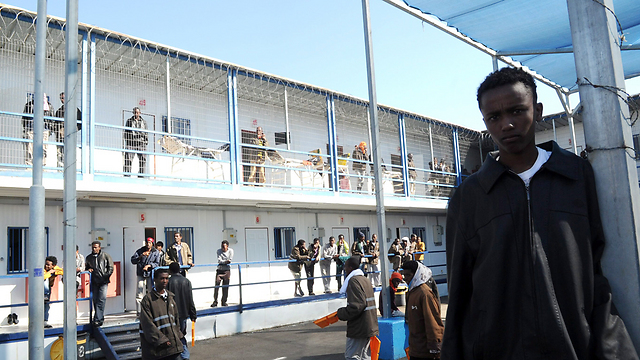Government looks to limit migrant incarceration period to 1.5 years
After High Court invalidates 'unconstitutional' amendment to Anti-Infiltration Law, Interior Minister Sa'ar is expected to propose limiting incarceration period for asylum seekers to year and a half. MK Shaked: Israel being taken over by labor migrants
Interior Minister Gideon Sa'ar is expected to present to Prime Minister Benjamin Netanyahu in the coming days an amended proposal that will limit the incarceration period of asylum-seekers to a year and a half, Ynet learned Tuesday.
The initial amendment to the Anti-Infiltration Law allows the incarceration of asylum seekers from Africa for up to three years, but last month it was invalidated by the High Court of Justice, which ruled that the law was unconstitutional and disproportionately impinged on a person’s right to liberty, as well as being in conflict with Israel’s Basic Law regarding human freedom and dignity.
Sa'ar's proposal is aimed at preventing the influx infiltration of additional migrants without violating the High Court's ruling.
Another alternative being weighed by the government is holding asylum-seekers who infiltrate Israel in tent cities.
Knesset Member Miri Regev (Likud) of the Internal Affairs Committee told Ynet that reducing the incarceration period is a "proportional and correct step." She urged Attorney General Yehuda Weinstein to support the initiative, "which has one goal only: To restore security to the residents of south Tel Aviv and the citizens of Israel."
During Tuesday's meeting of the Committee on Foreign Workers, representatives of the Population and Immigration Authority presented data showing that of the 14,500 migrants who filed requests for asylum in Israel between 2009 and 2013, only 24 were recognized as refugees. MK Ayelet Shaked (Habayit Hayehudi) said: "It is time that we look reality deep in the eye. Israel is being taken over by labor migrants who are seeking a better life at the expense of the security and quality of life of the country's citizens. These are not refugees who fear for their lives."
Committee Chairwoman MK Michal Rozen (Meretz) said, "This is a critical moment for asylum seekers in Israel, as important decisions on their matter are expected to be reached in the near future. The High Court instructed the authorities to act immediately toward the release of those who are being held illegally, but the relevant (authorities) have not been able to provide clear answers on this matter since the ruling was issued. I expect the government to quickly formulate a clear, humane and legal policy, as ordered by the High Court.
Supreme Court President Asher Grunis wrote in last month's ruling that "in the present circumstances, keeping people incarcerated for up to three years, as allowed by the law, is unconstitutional. Furthermore, the state intends to keep these migrants locked up for the entire period of three years permitted by the law. Some of these people have been imprisoned for over a year."
Grunis added that "if, God forbid, the phenomenon re-appears and massive infiltration resumes, the problem will have to be re-evaluated."
Justice Edna Arbel referred to the implications of the decision to invalidate the amendment to the Anti-Infiltration Law for the Israeli public. "I can assume that this decision will not sit well with Israeli citizens and will be particularly hard for those living in the southern sections of Tel Aviv, whose distress sounds genuine, evoking empathy and a desire to help," she wrote. "I would like to believe that the state will find a way to deal with the situation with the means at its disposal, so as to relieve the stress of local residents."
Arbel said that prolonged incarceration was the easy solution, but not the correct one. This solution is "the most harmful for anyone, but particularly for these migrants who are locked up for such extended periods. Depriving these migrants of their freedom for a prolonged duration is a critical and disproportionate infringement of their rights, impacting their bodies and souls. Let us not solve one wrong by creating another."
"We cannot deprive people of basic rights, using a heavy hand to impact their freedom and dignity, as part of a solution to a problem that demands a suitable, systemic and national solution,” Arbel said. "We cannot forget our basic values, drawn from the Declaration of Independence, as well as our moral duty towards every human being, as inscribed in the country’s basic principles as a Jewish and democratic state."
- Receive Ynetnews updates
directly to your desktop
















